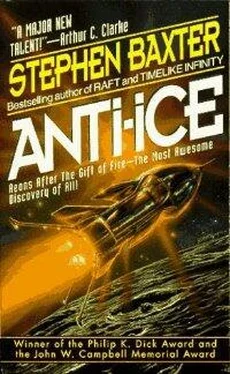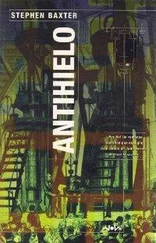Traveller had explained to me how a hatch at the lower skirt of the hull could be opened for the deposition of ice. I scrambled up a landing leg with an adroitness that surprised me, found the hatch, undogged its latches as Traveller had taught me, and was soon emptying my bag of ice into the tanks. Hastily I scooped up handfuls from my hill of collected ice and crammed them, too, into the hatch. I had to fumble at all of this with my mittened hands and the more I hurried the more I spilled ice wastefully; I was conscious the whole time that should our lens-host take it into its mind to go for a jaunt then surely I and the Phaeton would be hurled to an untimely death; and all the while, at the edge of my vision, I could see that other monster lens towering over the Phaeton’s, and drawing ever nearer.
At last it was done. I closed the hatch, hurled the empty bag far from me and dropped away from the ship’s leg, waving to Holden. I scrambled up the rope ladder which led to my air cupboard, eyeing the rocket nozzles nervously; as soon as Traveller could fire his engines he would surely not hesitate to do so, whether or not I was safely aboard, and so I had seconds to make myself secure. I hauled myself through the narrow hatchway, landing in the cupboard chest first like a fish and then hauling my legs behind me; I dragged in the rope ladder and my dangling air hose and was reaching for the hatch—
—when the rockets fired.
I was thrown against the bulkhead. My body was dragged toward the still-open hatch; I scrabbled at the riveted iron with my hands and legs, and for a terrifying period I lay crucified over the open hatchway, my head dangling on a stalk of neck.
The rockets raised a cloud of dust and pebbles from the carapace of our lens-beast.
The ship lurched abruptly sideways, and I had to latch my fingers around bulkhead plates. Then the lip of the larger lens-beast, which had towered over the Phaeton, slid across my field of view; and I realized that Traveller had been forced to drag us across the sky to avoid this second monster.
As we lifted out of the chaos of the Moon I saw how the greater beast had moved to cover ours completely—and then, with brutal suddenness, it dropped down its tube of pillars. The pillars of the lens on which we had rested were smashed to rubble, and fragments went wheeling across the landscape; both lenses were dashed to a thousand pieces against the ground. But this was not the end of it, for the fragmented lenses seemed to dissolve in a ferment of activity—I caught glimpses of tendrils of stone weaving through the debris and knitting it, it seemed, into a new whole; and I wondered if this were some astonishing form of lunar mating. And then the rising dust obscured my view.
As we rose and the lunar landscape opened out, I realized that this extraordinary merger was just one incident among thousands, for the entire plain was covered, I saw now, with similar maneuverings, couplings, and obscene devourings!
At last I dragged myself away from the lip of the port and allowed the hatch to close, shutting out my view of the receding Moon. I lay against the thrumming metal, sucking at thin air.
11
A SCIENTIFIC DISCUSSION
I do not remember the stilling of the engines; I must have floated in my iron coffin for several minutes. Then willing hands drew me gently out of my box and pulled away my helmet. I came to my senses still in the suit and with the copper ring chafing at my neck, but with my head free, and with the comparatively fresh air of the Cabin sweet in my nostrils.
Holden’s round face hovered before me, wearing an expression of genuine concern, and I grabbed his arm. “Holden! And have we survived? Are we free of the Moon?”
“Yes, my friend—”
“Of course we are!” Traveller barked from behind Holden. “If we aren’t off the Moon what are we doing floating around the Cabin? Perhaps we have been stuffing opium into our pipes, eh? What a pity your jaunt hasn’t un-addled your brains, my boy—” Sir Josiah’s eyes were fixed on me, and—though he seemed to be endeavoring to conceal it—I flattered myself that there was some pleasure in his stern countenance at the evidence of my recovery.
But Holden turned to him and said, “By God, Traveller, can you not desist? For all our sakes the boy has just been through a veritable nightmare, and all you can do is—”
“Holden.” I laid a restraining hand on the journalist’s arm. “Do not trouble yourself; Sir Josiah means no harm. It is just his way.”
Holden caught my meaning and said no more; though his face registered a reluctance to let the matter drop—and in the subsequent days I was to observe how his manner to Traveller had become noticeably frostier, a change which was evidenced in a thousand trivial exchanges.
Holden, it seemed, would have no truck with those whom he suspected of unsound views, whatever their achievements.
I was fed a clear, warming broth. Then I was allowed, for the first time in several days, a bath; and thus I became the first human to bathe in lunar water! I entertained some qualms as I entered the concealed bath, for what if the water contained some unknown agent inimical to human life?—but, now that it had been run through the Phaeton’s filter system, the Moon water looked, smelled and even tasted like any common-or-garden rainwater; and Traveller assured me that he had run a series of chemical tests on it before confirming its suitability for human contact and consumption.
At length I was safely lodged in my familiar seat. I was warm, bathed and dressed in my combinations and a towelling robe of Traveller’s, and I held a large globe of Traveller’s oldest brandy in one hand and a fine-scented cigar in the other. I began to feel rather proud of my exploits—now that they were safely in the past. Holden and Traveller sat with me, as did Bourne, who maintained his usual resentful silence. The stoical Pocket, unflappable, was working his way through several days’ backlog of begrimed dishes. “So, gentlemen,” I said, “in the end, quite a remarkable adventure.”
Holden raised his globe and peered into the glimmering depths of the brandy within. “Quite so. And not at all as we expected. We did not find anything resembling Earthly conditions, as we had anticipated—but nor did we find the Moon to be the inert and lifeless arena favored by some theorists.”
“Instead,” boomed Traveller, “we found something quite unexpected—as, paradoxically, we might have expected all along. The Phoebean life forms—for such I propose we call them; after Phoebe, Moon goddess of old Greece, sister to Apollo and daughter to Leto and Zeus—the Phoebeans are quite unlike anything encountered on Earth, both in their morphology and in their astounding vigor.”
I asked, “Sir Josiah, if the shattered side of the Moon were turned to Earth, would the Phoebeans’ frantic activities be visible to our astronomers?”
“Surely so; if only by changes of surface hue, and the raising of dust clouds—although we should remember that, without an atmosphere, dust has no medium of suspension, and once raised will settle rapidly to the ground. But even so I think we must conclude that the Phoebeans are at present confined to Traveller Crater on the far side of the Moon.
“And,” he went on, lifting his platinum nose, “this evidence of confinement supports an hypothesis I have been constructing as to the origin and nature of these lunar beasts.”
He inspected the ceiling with every evidence of interest. At last the tension had grown too great to bear—even the phlegmatic Pocket, polishing his dishes, looked around expectantly; and I demanded: “And your hypothesis is, sir?”
“Let us review the facts,” he said slowly, steepling his long fingers around his brandy globe. “We find these creatures at the heart of an immense crater—a crater which, we have speculated, is the result of an anti-ice explosion.
Читать дальше












